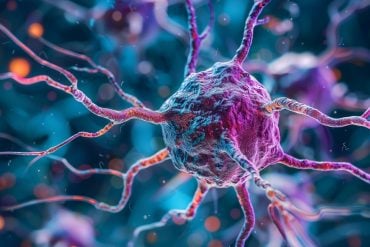Summary: Blocking the activity of the reactor called the aryl hydrocarbon receptor in T cells resulted in both a decrease in inflammation and recovery in mouse models of multiple sclerosis.
Source: University of Virginia
University of Virginia Health neuroscientists have discovered a potential way to disrupt the chronic inflammation responsible for multiple sclerosis.
UVA’s new study identifies a vital contributor to the hyperactive autoimmune response and neuroinflammation that are the hallmarks of MS. Blocking this lynchpin in a research model of MS alleviated the inflammation, giving researchers a prime target in developing new treatments for multiple sclerosis and other autoimmune diseases.
The research was conducted by Andrea Merchak, a doctoral candidate in neuroscience, and her colleagues in the lab of Alban Gaultier of the University of Virginia School of Medicine’s Department of Neuroscience and its Center for Brain Immunology and Glia, or BIG.
“We are approaching the search for multiple sclerosis therapeutics from a new direction,” Merchak said. “By modulating the microbiome [the collection of microorganisms that naturally live inside us], we are making inroads in understanding how the immune response can end up out of control in autoimmunity. We can use this information to find early interventions.”
Multiple sclerosis affects nearly a million Americans. Symptoms can include muscle spasms, stiffness, weakness, difficulty moving, depression, pain and more. There is no cure. Instead, treatments focus on helping patients manage symptoms, control flareups and slow the disease’s progression.
Scientists have struggled to understand the causes of MS, but recent research suggests an important role for the gut microbiome. UVA’s new findings bolster that, determining that an immune system controller found in “barrier tissues” such as the intestine plays a vital role in the disease. This regulator can reprogram the gut microbiome to promote harmful, chronic inflammation, the researchers found.

Gaultier and his collaborators blocked the activity of the regulator, called “aryl hydrocarbon receptor” in immune cells called T cells, which led to a dramatic effect on the production of bile acids and other metabolites in the microbiomes of lab mice. With this receptor out of commission, inflammation decreased and the mice recovered.
The findings suggest that doctors may one day be able to take a similar approach to interrupt the harmful inflammation in people with MS. That will take much more research, however. Scientists will need a better understanding of the interactions between the immune system and the microbiome, the UVA researchers say.
Still, UVA’s new research lays an important foundation for future efforts at targeting the microbiome to reduce inflammation responsible for multiple sclerosis and other autoimmune diseases.
“Due to the complexity of the gut flora, probiotics are difficult to use clinically. This receptor can easily be targeted with medications, so we may have found a more reliable route to promote a healthy gut microbiome,” Merchak said.
“Ultimately, fine-tuning the immune response using the microbiome could save patients from dealing with the harsh side effects of immunosuppressant drugs.”
About this neuroinflammation and multiple sclerosis research news
Author: Press Office
Source: University of Virginia
Contact: Press Office – University of Virginia
Image: The image is in the public domain
Original Research: Open access.
“The activity of the aryl hydrocarbon receptor in T cells tunes the gut microenvironment to sustain autoimmunity and neuroinflammation” by Andrea R. Merchak et al. PLOS Biology
Abstract
The activity of the aryl hydrocarbon receptor in T cells tunes the gut microenvironment to sustain autoimmunity and neuroinflammation
Multiple sclerosis (MS) is a T cell-driven autoimmune disease that attacks the myelin of the central nervous system (CNS) and currently has no cure. MS etiology is linked to both the gut flora and external environmental factors but this connection is not well understood.
One immune system regulator responsive to nonpathogenic external stimuli is the aryl hydrocarbon receptor (AHR). The AHR, which binds diverse molecules present in the environment in barrier tissues, is a therapeutic target for MS.
However, AHR’s precise function in T lymphocytes, the orchestrators of MS, has not been described. Here, we show that in a mouse model of MS, T cell-specific Ahr knockout leads to recovery driven by a decrease in T cell fitness.
At the mechanistic level, we demonstrate that the absence of AHR changes the gut microenvironment composition to generate metabolites that impact T cell viability, such as bile salts and short chain fatty acids.
Our study demonstrates a newly emerging role for AHR in mediating the interdependence between T lymphocytes and the microbiota, while simultaneously identifying new potential molecular targets for the treatment of MS and other autoimmune diseases.







